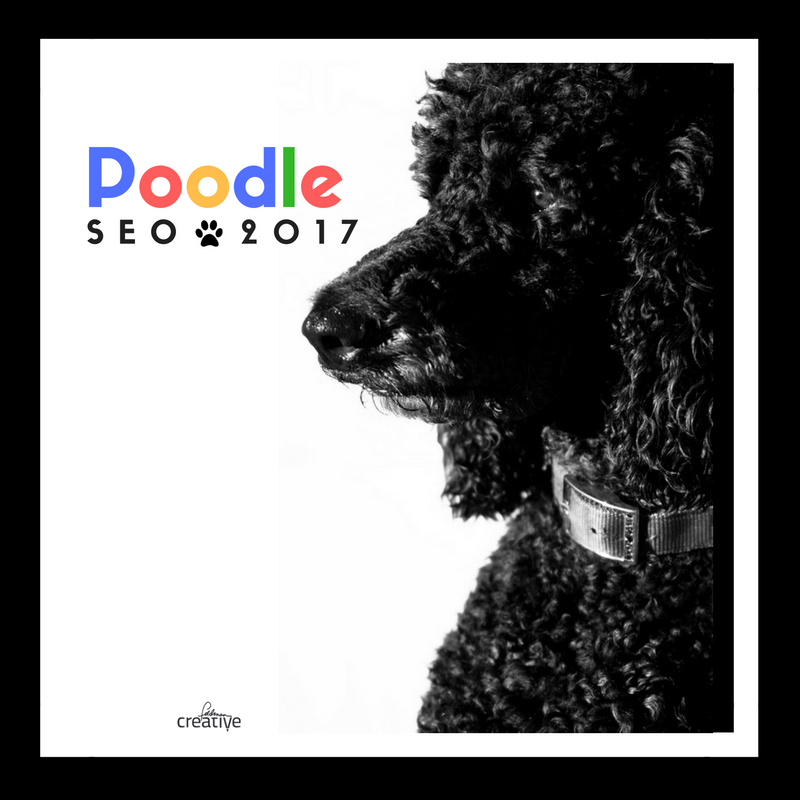
I’m going to scope out my take on SEO 2017.
Take it for what it’s worth. See, I don’t know what most SEO experts know. I’m a different kind of search engine optimization expert.
I’m a reluctant SEO expert
I never used the term “SEO” to describe my services or myself. I never liked the term “search engine optimization.” I never liked studying it. And I certainly never considered myself an expert.
Until I became one.
I learned how to separate the wheat from the chaff (oy) and do the research and writing required to publish content that appears on the first page of search. A lot of my posts and pages appear there. A lot of them got there fast—with no link building, buying or bartering.
What can I say? I should write a book about SEO to help simplify it for you. Wait, I did that.
So heed my disclaimer. Want scientifically extracted theories about causation and correlation? I’m going to let you down.
Want me to reveal, review or re-order the 200-plus search ranking factors you need to know to form more informed hypotheses about the world’s most mysterious algorithm? Goodbye and good luck.
You’ll have to settle for some simple speculation
The future of search is about the user experience. If it needs a name, we’ll call it user experience optimization. UXO? Why not?
The history of search was about relationships. Not human relationships, but relationships between websites, a.k.a., links. I’m not dissing links. They played an immense role. They still do.
Links fuel the machine. The Google database, enormous beyond comprehension, stores the locations of pages that are published, what’s on the pages, and which pages point to the pages. It wouldn’t work otherwise.
For better or for worse, links became the name of the game. The game became seedy. An endless appetite for backlinks gave birth to a business where ethics became optional.
I should know. Because of my achievements in guest blogging, and to a lesser degree, the momentum of my own blog, I’m often perceived to be (and pursued as) a link in the chain to bigger and better links. Translation: link seekers seek me. Everyday.
But there’s a problem with all this lust for links. People don’t care about links. Search engines do. People care about content.
We’re all outsiders trying to look into how Google does its thing. We know far less than we’d like, but we can agree on a few things:
- Google sells ads and allocates its most valuable page real estate to those willing to pay for them.
- Google’s less concerned about rewarding non-advertisers with clicks than it once was.
- Still, Google aims to reveal pages containing the content its users want.
- Google tracks and analyzes what happens after we click.
The point I’m making is based on that fourth bullet. What happens after we click, the user experience, is what will matter most going forward.
User experience optimization is based on three things
- Clicks
- Consumption
- Action
Got it? There might be better names for these things and I suspect us marketing folks will throw everything we’ve got at labeling them. Let’s settle for clicks, consumption and action for now. And let’s get into ‘em a bit.
Clicks
I have nothing fancy for you here. A click’s a click. If your content should earn a high rank and perform poorly as measured by clicks, it’s bound to be demoted. A page in the 10th position that somehow “clicks butt” over the 9 listings above it will be promoted.
Again, this is speculation. Even the simple subject of click-through rate (CTR) is hotly debated. I promised to shield you from the endless ranking factors debate, but you can read about the Yes/No CTR argument here, if you’d like.
The post includes an answer from a Google spokesperson, but it’s just more Google-babble. It would appear those given the green light to answer questions regarding the Google algorithm are trained in the fine art of not answering the question, much like a presidential candidate.
Try arguing that observation. And while you’re at it, answer me this: When was the last time someone from Google was asked if X or Y or Z was a ranking factor and the answer was “yes?”
So what does a champion of SEO 2017 (or UXO pro) do to win more clicks?
Write a magnetic headline. The headline has to earn eyeballs and do what every great headline does: inspire you to keep reading.
Write a compelling snippet. Tough stuff here because the meta description you write may or may not be displayed. It’s often replaced by content from the page that contains matching keywords or semantically related words. To some degree, you must surrender control. For now, all you can do is keep trying to make your descriptions sell your content.
Write a smart URL. Your URL may not have the click magnetism of the headline or snippet, but a wordy or sloppy one may work against you. Make your URLs brief and focused.
Get ranked. I suppose this is a no-duh tip because your page can’t get clicked if doesn’t appear. Essentially, getting ranked traces to all these optimization ideas past, present and future. For the record, table stakes include:
- Creating a great page.
- Indicating the relevance of the page by tagging it per the requirements of the search engine.
Build relationships. When high authority websites link to your content, authority (ranking power) is passed on to it. Build relationships with those that have high authority websites and you’ll benefit from being included in their content when it contains a link to yours.
Consumption
Admittedly, I delivered no major lightning bolts above. Stories about search rankings never do.
And to be clear, I’m not about to create the ultimate list to achieving greater content consumption. I do want to point out, however, this idea—the user’s experience consuming the content—is a biggie. In 2017, I believe it’s to become THE biggie.
This is my opinion. It’s not based on crunching the numbers of millions of posts. There are plenty of posts like that and if you can stay awake through them you may gather some useful insights.
My theory is simple. Google gathers how long visitors spend on a page and website. Yes, there are imperfections in the data gathering process. Yes, black-hatters can and will find ways to artificially inflate these stats.
And yes, time is only one measure of consumption. A page featuring a one-minute video can be 100% consumed in, well, one minute. Consumption metrics aren’t perfect. They’ll evolve.
But hang with me here. If a search engine’s job is to steer you to the content you’re looking for, how can consumption NOT enter into the equation?
So what does a champion of SEO 2017 (or UXO pro) do to compel greater consumption?
Invest more in content creation. If you want to increase the consumption of your content, you have to increase the quality of your content.
Understand: you don’t want deeper websites. You want deeper web pages.
Regardless of what anyone tells you or how any “authority” creatively interprets data, you’ll do better with one amazingly deep page than you will with a website a million pages wide that’s devoid of any depth.
Invest more in content distribution. You can put this one in the common sense file: to increase the consumption of your content you have to expose it to more people to whom it’s useful. The web’s flooded with content. It’s time to build your arc and figure out how to keep your content from drowning.
Optimize for intent. Search has gone semantic.
Semantic search is a data searching technique in a which a search query aims to not only find keywords, but to determine the intent and contextual meaning of the words a person is using for search. (Techopedia)
It’s sort of simple… A searcher may type or say “restaurant,” a classic keyword, or “place to eat,” a semantic variation, and mean the same thing. Google gets this now.
But it’s sort of complex… Content optimizers now, though they may uncover an SEO opportunity based on a keyword or phrase, must create content with context in mind. My friend Andy Crestodina—an SEO sage to be reckoned with—said, you need to optimize for “things, not strings.”
Action
The success of a website or webpage ultimately traces to the user taking action.
Here’s the world’s top 7 websites as measured by traffic with Alexa:
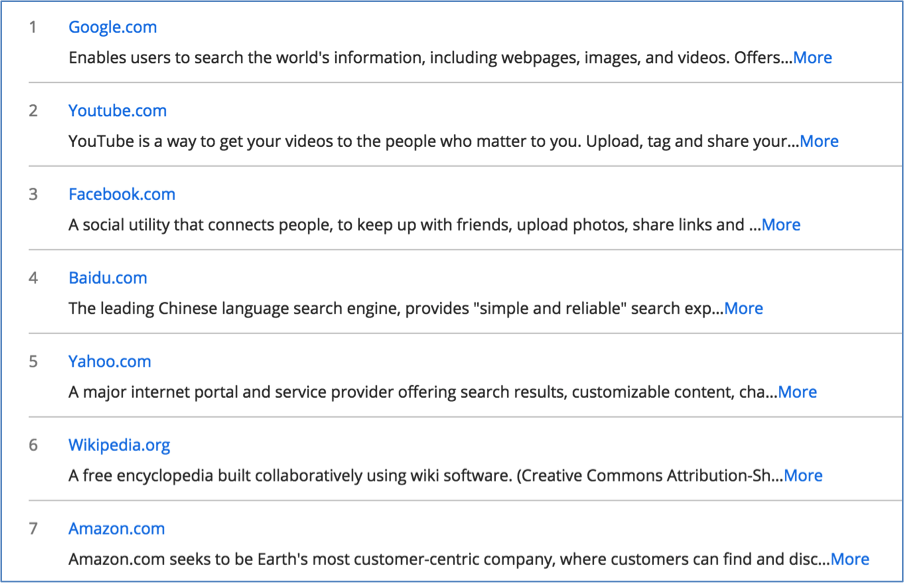
Check ‘em out. What do they have in common? Users go there and take action. Number one is Google. When you go there you do something. You enter a term then you click.
Number two is YouTube. It’s all about action. You search there. You watch. You interact. Number three is Facebook. Action, action, and more action.
Whether it’s reading, watching, listening, entering information, clicking, uploading, downloading, liking, sharing, scrolling, buying this or trying that, user experience is measured as consumption and action. The quest for achieving user action is the common denominator of all websites.
Action (or lack of it) is the user experience. Action’s bound to be a factor on the SEO 2017 horizon. So the rules are likely to change because action needs to be quantified. Tough one, I know, except what about those actions that are quantified every which way day and night? Social shares. Social shares are easy-to-measure actions.
Social shares are soon to be a ranking factor. Google has forever claimed social shares are not a search ranking factor. They will change their tune in 2017.
For what it’s worth, consider Google’s position on social shares to date, which could be considered is a bit of a defensive strategy.
- Social struggles—The company has tried to gain traction in social media. They have failed. Google+, despite its many cool features, is a loser. The millennial generation barely recognizes its existence.
- Competition—The biggest threat to Google is Facebook. Ad dollars that once went to Google, are going to Facebook. For this and other reasons, Google has an anti-Facebook bias.
- Irrelevance—Historically, social shares have not been a reliable indicator of relevance or value. Often, high share counts don’t even equate to high consumption. Google’s in the relevance game.
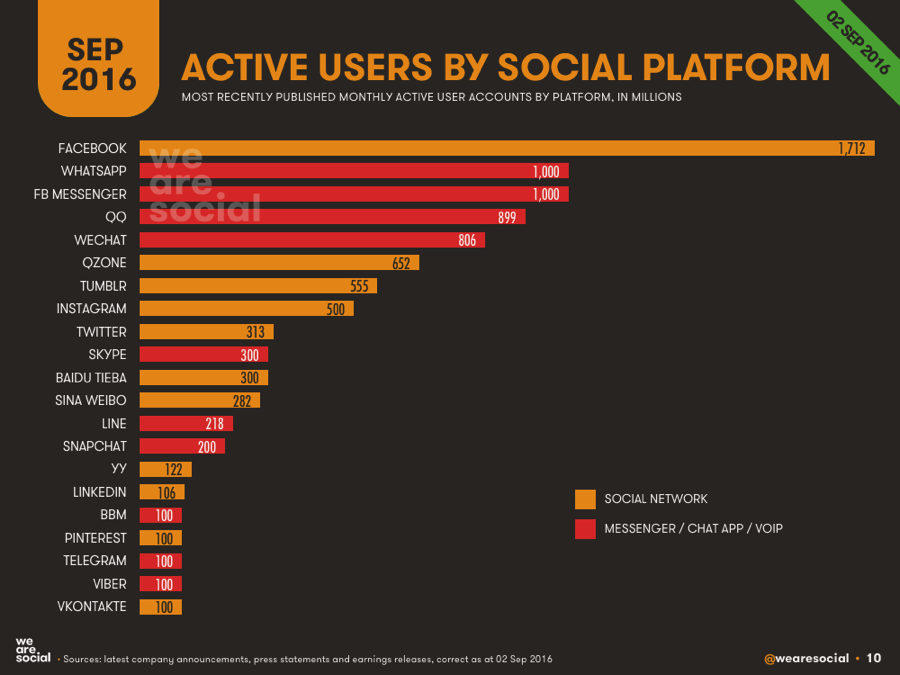
Facebook rules social and the list above would have to be even longer to include Google+.
“Really, the argument isn’t whether social sharing causes organic search rankings or organic rankings cause social sharing. It’s about how engaging your content is.” ~ Larry Kim (on the Moz blog)
How else might Google measure action? Hell if I know. The answer, probably, is however they want. There are a lot of different actions you can take on a web page and I hit on many of them above.
Nobody at Google has asked for my thoughts on how to measure search ranking worthiness, but let me just toss one out there: form fills.
Filling out a form is an action, a very deliberate action that strikes me as very clear indicator of interest, relevance, and engagement.
Attention Google: I hereby nominate form fills for consideration in your algo.
Stop…!
Okay, I’m done, for now. I don’t know how search will change to stay current. You don’t know. The SEO experts don’t know. Even Google doesn’t know.
Here’s what I do know: It will change.
My opinion and prediction is the significant changes will be all about the UX game, which is about clicking, consumption and action.
I predict Google or someone will give it a nickname. Recent history suggests it’ll be an animal starting with the letter P. Ladies and gentlemen, SEO 2017 is…
The Poodle Update—Google fetches UX
Every company must change to stay competitive. Google understands this as well as anyone. The company and its search engine changes a little every day.
Big changes are coming in 2017 because the game at large is changing insanely fast. The web itself is becoming less dominant. Whoa. Wait. What?
Yes indeed, if you have teenagers (as I do), you know exactly what I mean. This generation prefers apps. You simply can’t challenge this conclusion.
A recent post on PCMag.com, ComScore: Desktop Browsing on the Decline, presents the following findings from ComScore:
- Desktop is relatively flat in total engagement and is losing share to mobile, which now accounts for 65% of digital media time spent.
- Mobile apps now drive the majority of digital time spent at 56%
- Smartphone apps alone look to account for a majority of digital media consumption in 2016
- Within the “millennials” age bracket—those between the ages of 18 and 34—one-fifth don’t use a desktop PC at all
- 97% are mobile users, whether they use their mobile devices exclusively or consider themselves multi-platform users
Given this evolution of digital consumption, unsurprisingly, search usage is also in decline.
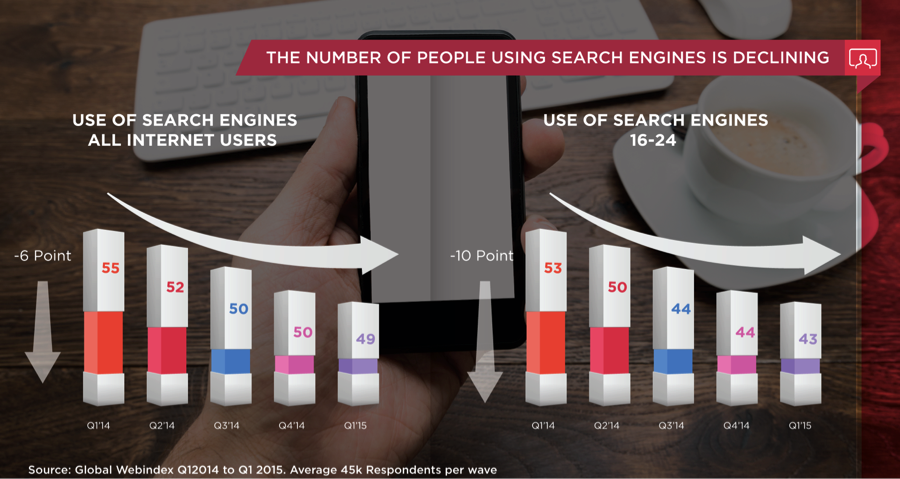 The decline’s significant: down from 55% to 49% in one year. For younger demographics, the change was even more marked. (Note this data is based on a survey, not actual search click data). Still, it’s telling that people say they are using search less now than ever before.
The decline’s significant: down from 55% to 49% in one year. For younger demographics, the change was even more marked. (Note this data is based on a survey, not actual search click data). Still, it’s telling that people say they are using search less now than ever before.
A 2015 post from Business Insider offers three reasons, sourced from ZenithOptimedia and GlobalWebIndex:
- Mobile behavior is app based. App usage represents 86% of time spent on mobile, according to Flurry.
- People discover content through social. The top eight social networks drove more than 30% of traffic to sites in 2014, up from 22% in 2013, according to Shareaholic.
- Screen sizes are small. It’s more difficult to type out long queries.
Perhaps the most telling indication of all is Google’s gone silent on the matter of search volume. During its insane ascent from 2000 – 2012, Google reported figures annually. Then they stopped.
This website attempts to fill in the blanks in years 2013 and 2014, but doesn’t reveal its sources. If they’re valid, the reveal is 2014 marked the first decline in search volume. Search Engine Land takes a weak stab at updating the numbers here.
My take: when you stop bragging about your numbers it’s because you don’t want people to know what they are. Search volume is going down. It’s in the trillions, so there’s no need to overreact, but suffice to say things are changing.
The web itself has begun to give way to a more powerful trend in digital—the consumption of apps. Gen Y has spoken.
Though they’ve tried, Google has failed to make search mobile-friendly, or mobile friendly enough. If your technology is not mobile-friendly, it’s not future-friendly. And, as we’ve seen with media, technology and just about everything, anything that’s not future-friendly is bound for the inevitable slide down the right side of the bell curve.
And now back to the future
Search may be becoming less important, but no marketer with 20/20 vision (or corrective lenses) will be tuning out anytime soon. The better approach is to simply look around, all around, at the past, present and future.
We know what we know now about SEO based on the past. We know at present the connected world is changing rapidly. And we must realize SEO 2017 will differ from SEO 2016.
Ranking signals have never been clear and never will be. I propose one thing is: user experience will soon trump all. I can’t tell you how it will be measured. Google tends to figure that stuff out.
But it’ll still be a secret.





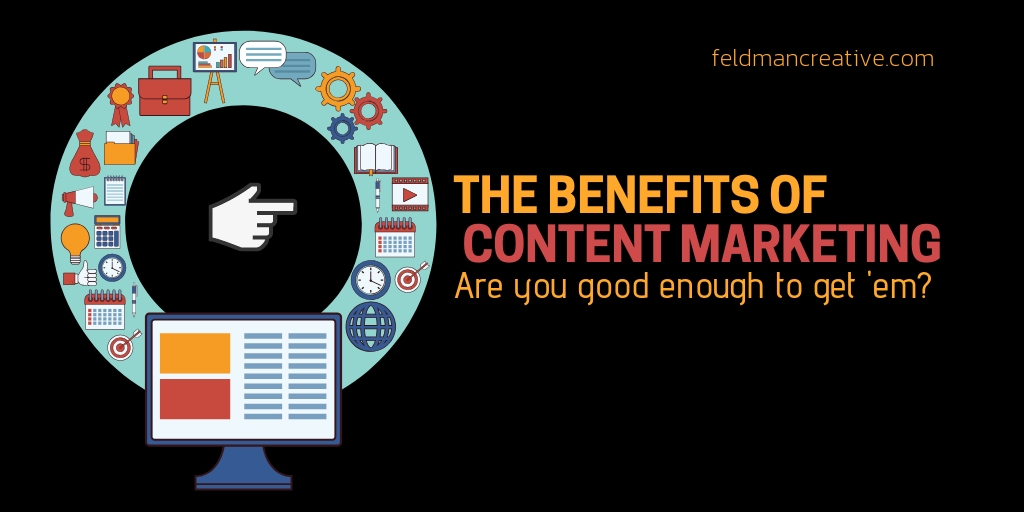
![The Most Common & Costly SEO Mistakes [Content Jam Episode 35] The Most Common & Costly SEO Mistakes [Content Jam Episode 35]](https://feldmancreative.com/wp-content/uploads/2018/09/Content-Jam-podcast-35.png)
Comments
Alexander Abramov
What a great and useful post! Thanks а million, Barry! Two thumbs up!
Manish Sharma
I am digital marketer. You share some interesting points in your post. you are great. I think i need to learn more. Thanks for share. 🙂
Helen
It’s always seemed to me that Google search is a very blunt instrument anyway if you’re looking for comprehensive information online. I’m rarely satisfied with the results that come up in any searches I perform.
In fact, I’m often shocked at the poor quality of regurgitated information that shows up. So I’m not surprised that search volume is down.
Google struggles to find sufficiently precise ways to categorize websites in order to make the results more relevant, so it’s not surprising that content curation is happening in other places instead, like Twitter and LinkedIn.
Barry Feldman
Very interesting Helen. Never heard anyone say something like that before.
Brian Dean
Awesome, Barry!
I agree 100%: Google is moving more towards “action” (as you put it so well). It’s less about “slow” signals like backlinks and keyword usage and more about what users want RIGHT NOW.
Again, great stuff as usual 🙂
Susan
My compliments, Barry, on the easy to comprehend analysis on SEO < UXO from a person new to the ways of the digital marketing game. So much of what you include above was echoed at my recent session of UCLA Best Practices in Social Media class with @ErikDeutsch that it's like having my very own cheat sheet to study. The quality of the comments below suggest smart types hang out here as well and I'm happy to learn from people engaged in intelligent observation and participation. Thanks for content heavy posts that make you part of the share-ecomomy. I intend to pay-it-forward by informing others of your resource.
Barry Feldman
Absolutely awesome comment. Thanks Susan. Happy to know you’ll be hanging around this blog.
Rob
Some interesting stats there Barry. If google is losing out to apps it will be interesting to see how websites who rely on search engine traffic react to the changes.